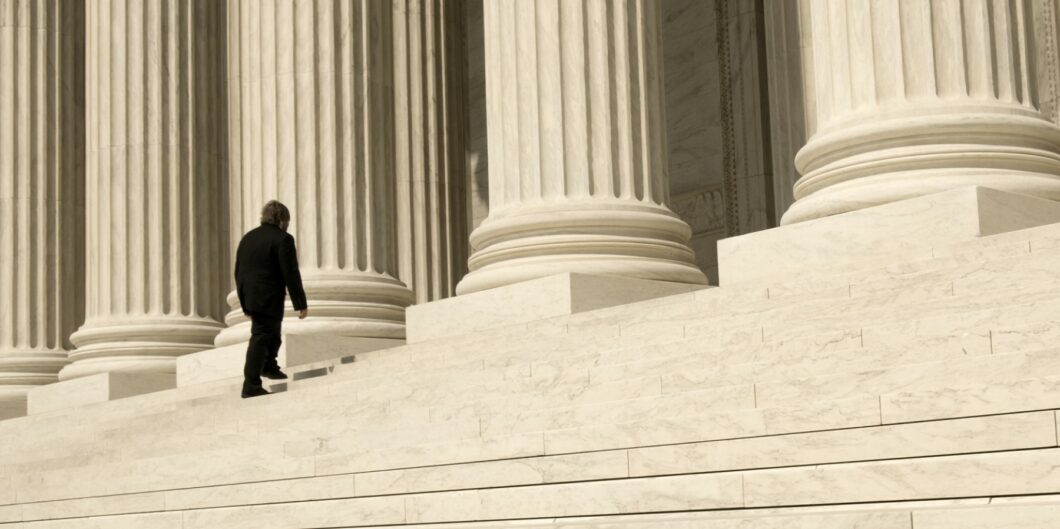In the student loan case, the Court did not have to make use of its recent agency-deference jurisprudence. But further developments may be coming soon.
The Court's Defense of the "Forgotten Man"
The nineteenth-century Yale political theorist and sociologist William Graham Sumner once celebrated the “Forgotten Man.” According to Sumner, he (or she) is “the victim of the reformer [and] the social speculator” and is thus forced to pay higher taxes and endure burdensome regulations generated by their schemes. All the Forgotten Man wants is “true liberty”—the liberty to live according to his desires, preferences, and moral imperatives.
Modern theorists of public choice offer a description of government that confirms Sumner’s fears for the Forgotten Man. Government responds to concentrated interest groups at the expense of diffuse groups, like taxpayers, composed of Forgotten Men. The Forgotten Man is rationally ignorant of politics because his vote is less likely to influence an election than he is of being hit by lightning on the way to the polls. He faces free rider problems because however much time and effort he spends in protecting his liberty, it will be ineffective unless he has a mechanism to bond others to do the same. By contrast, other groups, united by financial or identity interests and the structures and groups built around them, find it much easier to influence affairs. They can lobby the government and other institutions, provide campaign contributions, and vote as a bloc on issues of paramount importance to them.
One way of understanding the political (as opposed to the more narrowly legal) significance of the most important cases in the Supreme Court’s last term is that they struck blows for Sumner’s Forgotten Man. The Supreme Court vindicated both the separation of powers and individual rights that help the Forgotten Man enjoy the true liberty threatened by the social engineering schemes of those well-organized politically.
Biden v. Nebraska
In the student loan forgiveness case, the President was responding to an important concentrated interest group in his coalition—young college graduates, most of whom owe student loans. He decided to cancel $10,000 of debt for anyone who had a student loan so long as they were earning less than $125,000. The cost was $430 billion.
This heavy cost, of course, would be borne by taxpayers, a quintessentially unorganized group. The exaction is impossible to justify as a matter of sound public policy. The students had voluntarily taken out loans. Taxpayers had no say in these private decisions. Perhaps worse, $125,000 is far in excess of the median income in the nation. And since most who took out student loans are young college graduates, many could look forward to earning even more in the future. Thus, much of the redistribution would be going to the well-off in society.
The administration contended that provisions of the so-called HEROES Act allowed it to “waive” or “modify” any regulatory or statutory provision in connection with the student loan program during an emergency (in this case, Covid). But beneficiaries of the program were not required to demonstrate any specific, personal harm they had suffered from Covid.
The Roberts Court rejected this invocation of statutory authority. First, it concluded that the term “modify” traditionally authorized only modest changes in programs, not matters like the repudiation of a debt. Second, the administration had not shown that they had “waived” any specific provision of regulation or law. Third, the administration did not just permit repudiation of debt, but set out various substantive requirements (like the earnings ceilings) which also exceeded their authority to “modify” the program. Finally, in response to the argument that the Court’s meticulous parsing of the words “modify” and “waive” would undermine the purpose of the act to address emergencies, the Court stated that on major questions like the expenditures of hundreds of billions of dollars, Congress was presumed to reserve the important policy tradeoffs for itself.
This last holding is a key protection for the Forgotten Man. He is at a disadvantage in almost any democratic process, but even more so in a wholly executive process. The federal legislative process at least makes it difficult to get exactions through. For a piece of legislation to pass through committees and both houses and to secure the signature of the President, it generally requires consensus support which militates against large special interest exactions. Certainly, there was never any prospect of getting Biden’s massive loan forgiveness program through Congress. When Democrats controlled Congress, they did not even try. By protecting the primacy of this process for large government spending programs, the Court makes it more likely that the Forgotten Man can defend his interests.
Students for Fair Admission v. the President and Fellows of Harvard College
Surely one of the true liberties of the Forgotten Man is to be judged on his merits without respect to his race or ethnicity. Yet racial preferences in universities—certainly public universities and those supported by government funds—deny him that liberty. Just as taxpayers are likely to be forced to pay out subsidies for the benefit of interest groups, so are these liberties likely to be curtailed for the benefit of organized groups. Groups organized around racial or ethnic identity are the primary, although not exclusive, drivers of preferences. They can persuade legislatures to enact even unpopular schemes of preferences, just as concentrated financial interests are better at gaining unpopular subsidies from legislatures. For instance, the California legislature voted to reinstitute racial and ethnic preferences at state universities. But even in that liberal state and even while being outspent 14 to 1, opponents succeeded in defeating the legislative proposal overwhelmingly.
No one would doubt for a moment that a journalist could not be required to write about same-sex marriages if he did not want to, nor could a director be required to make a film about them.
Racial preferences also get political momentum by having relatively clear beneficiaries and relatively unclear losers. Those who do not get into a selective college, for instance, cannot very easily explain why they failed. The Forgotten Man is often in the position of not knowing exactly how exactions have affected his liberty.
The amicus briefs in Students for Fair Admissions v. Harvard also demonstrated the power of interest groups that the Forgotten Man faces in avoiding the obstacle of racial preferences. A huge number of other universities and large companies filed on behalf of Harvard. Because these companies are fearful that they may be sued if they do not have adequate members of minority groups among their employees, they have a vested interest in selective colleges credentialing their future hires. And, of course, universities have entire bureaucracies that have grown up around the structure of their admissions process.
The Court protected the Forgotten Man by allowing him or her to compete without the barriers of racial and ethnic discrimination supported by many interest groups. That said, the Court did not decide on the legal basis I would have preferred. As I argued previously, and as Justice Gorsuch wrote in his concurrence, the Court could have simply held that Title VI forbade discrimination. Reaching the Equal Protection Clause was only necessary if one accepted previous, egregiously wrong interpretations of Title VI that had substituted the more opaque language of the Equal Protection Clause for the clear antidiscrimination command of Title VI. But the result of either approach is to restore freedom from racial discrimination practiced or funded by the government—an essential aspect of true liberty.
303 Creative LLC v. Elenis
In 303 Creative, the Court permitted wedding website designers to refuse to create customized websites for same-sex marriages, because website design is an expressive activity, as all parties stipulated. Speaking freely or refraining from speaking is part of the true liberty prized by the Forgotten Man.
Colorado had expanded its public accommodation law to include all businesses offering any service to the public and prohibited discrimination on the basis of sexual orientation. Colorado then interpreted discrimination to include refusal to provide services for same-sex weddings, even if the seller of the service was willing to serve people of any sexual orientation.
The Court held that the Constitution did not permit a state to require anyone to express or endorse a message in his commercial activity simply because he received pay for his services. One of the important conclusions of the case is that ordinary people engaged in commerce—quintessentially the Forgotten Man of whom Sumner spoke—have the same rights as writers and artists. No one would doubt for a moment that a journalist could not be required to write about same-sex marriages if he did not want to, nor could a director be required to make a film about them. Why should they have greater rights than those engaged in other areas of commerce, even if less celebrated by the chattering classes? 303 Creative was, like the student loan case, a decision that gave voice to those who do not have the megaphone that journalists, academics, and entertainers do.
Now it might be argued that a same-sex couple also wants to exercise true liberty in getting services for a wedding. Let us set aside the question of whether forcing someone else to act for you is a liberty in the same sense as deciding whether to act yourself. There was never any evidence in this case that same-sex couples would have been substantially hindered in getting services for their wedding. Couples can seek website designers in a national market, and large majorities of Americans now approve of same-sex marriage. The celebration of events like Pride Day, which are now even part of many children’s first-grade education, shows that, as with the affirmative action issue, the weight of institutional support is almost entirely on one side of the debate, even if in the past religions exerted a sometimes oppressive influence on government. Thus, this law was not about making sure that same-sex couples get services, but about protecting them against the indignity that they may feel from the expression of heterodox views—in this case, Lorie Smith’s opposition to same-sex marriage. The comments about the case from the faculty at my own university focus on that concern. But free expression is incompatible with laws promoting emotional well-being at its expense.
Democracy may be the worst form of government except for all the others. Yet, as Sumner recognized, democracy alone cannot protect the Forgotten Man. But enforcing the separation of powers and individual rights, as the Supreme Court did last term, can help him flourish.



